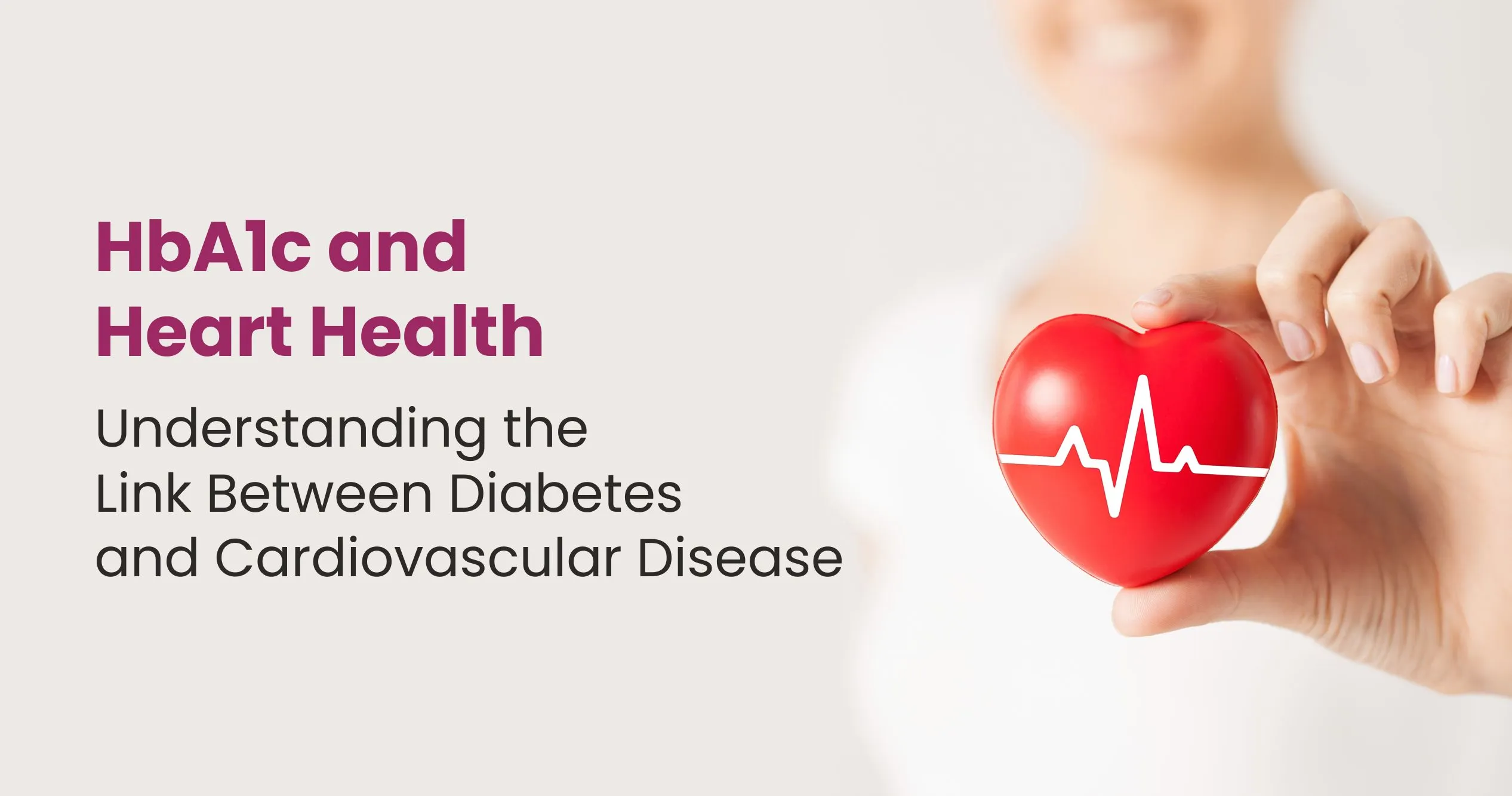HbA1c and Heart Health: Understanding the Link Between Diabetes and Cardiovascular Disease
Mar 15, 2024

Diabetes and cardiovascular disease (CVD) are closely interlinked and pose significant health risks worldwide. A key player in this relationship is the HbA1c level. It is a widely recognised marker for long-term blood glucose control in individuals with diabetes. Studies suggest that people with Type 2 diabetes are more prone to developing strokes, heart attacks, and heart than people with regulated blood sugar. Let us find out how HbA1c levels contribute to maintaining your heart health.
What is HbA1c?
Before we dive into the link between HbA1c and heart health, let's first understand what HbA1c is. HbA1c is known as glycated hemoglobin, which reflects the percentage of hemoglobin proteins in the blood that have glucose attached to them. In blood tests, it measures the average blood glucose levels over the past two to three months. It provides a reliable estimate of how well an individual's diabetes is being managed.
The higher the HbA1c level, the higher the risk of developing diabetes-related complications, including cardiovascular disease. The different HbA1c levels and associated conditions are:
|
HbA1c Level |
Interpretation |
|
Below 5.7% |
Normal |
|
5.7% - 6.4% |
Prediabetes |
|
6.5% or higher |
Diabetes |
Connection Between Diabetes and Cardiovascular Disease
There is a very complex bidirectional link between HbA1c and heart health, which has a great impact on people’s overall well-being.
- The risk of getting life-threatening conditions like coronary attacks, stroke, and heart failure among persons with type 2 diabetes is significantly higher compared to healthy ones.
- It is even observed that the risk of developing cardiovascular disease is two to four times higher in individuals with diabetes compared to those without the condition.
- Conversely, individuals with existing cardiovascular disease are more likely to develop diabetes. This is due to the shared risk factors and underlying mechanisms involved in both conditions, such as inflammation, oxidative stress, and endothelial dysfunction.
- High blood glucose levels can cause damage to the blood vessels and contribute to the development of atherosclerosis, which is the buildup of plaque in the arteries. This narrowing of the arteries can lead to reduced blood flow and an increased risk of cardiovascular events.
These complications highlight the importance of maintaining optimal blood sugar control, as represented by HbA1c levels, to minimize the risk of cardiovascular events.
Why Does Diabetes Increase the Risk for CVD?
Several other interconnected conditions contribute to the heightened risk of cardiovascular diseases in people with high HbAc1 levels. Let's explore these factors in detail:
High Blood Pressure (Hypertension)
Insulin resistance, which occurs when cells become less responsive to insulin, has shown a strong correlation with hypertension. The combination increases the chances of developing CVD by at least twofold. High blood pressure strains the heart and damages blood vessels, increasing one’s risk of fatal complications.
fatal complications.
Abnormal Cholesterol and High Triglycerides
Individuals with diabetes often have an unfavorable cholesterol profile, characterized by high levels of low-density lipoprotein (LDL, or "bad" cholesterol), low levels of high-density lipoprotein (HDL, or "good" cholesterol), and elevated triglycerides. This condition is known as diabetic dyslipidemia or atherogenic dyslipidemia. It is closely associated with insulin resistance and can accelerate the development of premature coronary heart disease.
Obesity
Obesity is a significant risk factor for both CVD and insulin resistance. Excess body weight contributes to the development of insulin resistance, which in turn can lead to type 2 diabetes. Furthermore, obesity is often accompanied by other risk factors, such as high blood pressure and abnormal cholesterol levels, further exacerbating the risk of CVD.
Lack of Physical Activity
A sedentary lifestyle is a modifiable risk factor for both insulin resistance and CVD. Regular physical activity helps prevent or delay the onset of type 2 diabetes. It also plays a crucial role in reducing blood pressure and improving overall cardiovascular health.
Managing HbA1c for Better Heart Health
Maintaining optimal HbA1c levels is key to reducing the risk of cardiovascular disease in individuals with diabetes. Here are some strategies to help manage HbA1c and promote better heart health:
- Lifestyle Modifications
Adopting a healthy lifestyle is the cornerstone of managing diabetes and reducing cardiovascular risk. This includes following a balanced and nutrient-rich diet, engaging in regular physical activity, maintaining a healthy weight, and quitting smoking.
- Medication Management
For individuals with diabetes, adhering to prescribed medications is essential in controlling blood glucose levels. It eventually helps in reducing the risk of complications of cardiovascular disease.
- Regular Monitoring
Regular HbA1c testing, typically every three to six months, is recommended for individuals with diabetes. This allows healthcare providers to monitor the effectiveness of treatment and make necessary adjustments to achieve optimal blood glucose control.
- Multidisciplinary Approach
Managing diabetes and cardiovascular risk often requires a multidisciplinary approach. It should involve healthcare professionals such as endocrinologists, cardiologists, dietitians, and exercise specialists. This collaborative effort ensures comprehensive care and personalized treatment plans.
Key Takeaways
The link between HbA1c, diabetes, and cardiovascular disease is undeniable. By maintaining optimal HbA1c levels through lifestyle modifications, medication management, regular monitoring, and a multidisciplinary approach, individuals with diabetes can significantly reduce their risk of developing cardiovascular disease.
Do you know anyone with diabetes or who may develop it? In that case, it is important to work closely with your healthcare team to monitor and manage your HbA1c levels and overall cardiovascular health. If you are looking for reliable HbA1c testing and comprehensive diabetes management services, you can visit some of the reputable diagnostic centers in India, like Apollo Diagnostics. Timely testing helps you take control of your health and reduce the risk of cardiovascular complications.
FAQs
1. How does diabetes increase the risk of cardiovascular disease?
A) Diabetes can damage blood vessels and contribute to atherosclerosis, increasing the risk of heart attacks, strokes, and other cardiovascular complications.
2. Can lifestyle changes help manage HbA1c levels?
A) Yes, adopting a healthy diet, regular exercise, and maintaining a healthy weight can help improve blood glucose control and lower HbA1c levels.
3. How often should HbA1c levels be monitored?
A) For individuals with diabetes, HbA1c levels should be monitored every 3-6 months to assess blood glucose control and adjust treatment if needed.
4. Can medications help lower HbA1c levels?
A) Yes, medications like insulin and other glucose-lowering therapies can effectively lower HbA1c levels and improve diabetes management.
Related Blog Post
Blog Categories
- Child Health
- Mens Health
- Women's Health
- Mental Health
- Health Myths & Facts
- Fitness
- Nutrition/Recipes
- Remedies
- Weight Management
- Stress Management
- Health Supplements
- Addiction Management
- Disease Management
- Allergy
- Anemia
- Arthritis
- Asthma
- Autoimmune Diseases
- Blood Pressure
- Cancer
- Deficiencies
- Dengue/Malaria/Chikungunya
- Diabetes
- Eye Problems
- Heart Diseases
- Hepatitis
- HIV/AIDS/STD
- Hormonal Imbalance
- Infection/Flu/Viral
- Kidney
- Liver
- Menstrual Problems
- Pregnancy
- Skin & Hair Problems
- Stomach Ailments
- Thyroid
- Others
- Health Checkups
- Diagnostics/Pathology
- Lifestyle & Wellness
- Covid
- Medical Tests
- Cholesterol
- Health Tips
- Parent Care/Old Age
- Lungs
- Food Intolerance








